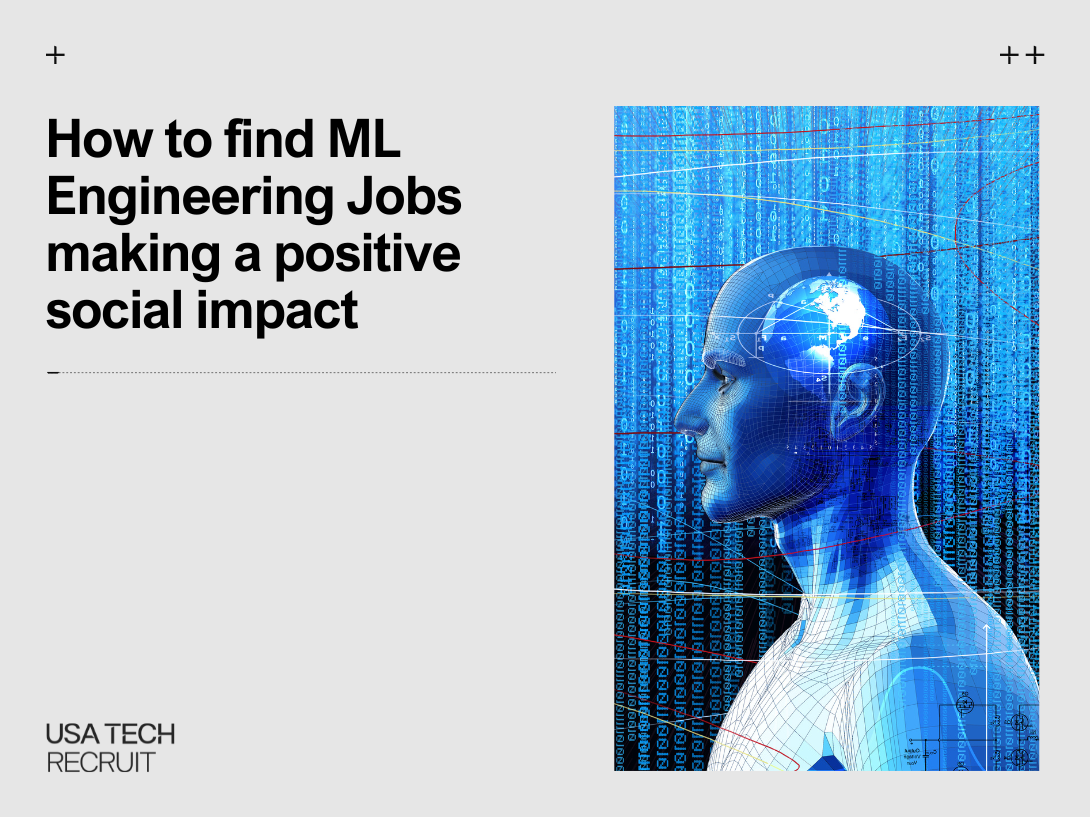How to find ML Engineering Jobs making a positive social impact

In this article:
This is a guide to finding ML Engineering jobs making a positive social impact in the US today.
With demand for ML talent sky high, finding roles that create a positive social impact have become a priority for engineers who want to use their skills as a force for good.
However, in this job market it is easy to feel a little overwhelmed.
Half of today’s work activities will be automated by 2055, while 9% of total employment in the U.S. is expected to be automated within the next 10 to 20 years.
This unprecedented change is why ML engineers are amongst the highest-paid tech workers in the U.S.
But high salaries and excellent career prospects are not the only reason people get out of bed in the morning.
ML engineers have a lot to offer to the whole community, with their skills playing an increasingly essential role in the improvement of society.
To help you make an informed career choice, doing the kind of work you enjoy and contributing to changing society for the better, we’ve created this handy guide to finding ML Engineering jobs that are having a positive social impact in America today.
Chapters:
- Responsible Machine Learning
- ML and Environmental Sustainability
- Tech for Good
1: What is Responsible Machine Learning?
The World Economic Forum expects that ML and Artificial Intelligence (AL) will have generated 97 million new jobs by 2025.
However revolutionary an invention AI/ML might be, this is also an extremely disruptive technology: the way an ML/AI product is designed, developed, and distributed can either promote or hinder social equality.
In recent years, the Responsible Tech movement has emerged to staff the tech industry with professionals who can identify and mitigate the potential negative impact of a given product, such as algorithmic and design bias, filter bubbles, misinformation, and privacy breaches.
Luckily for all conscientious ML engineers out there, AI/ML is the most in-demand area of expertise required by the Responsible Tech job market.
Here are some examples of responsible ML Engineering positions advertised last year:
- Senior Artificial Intelligence & Machine Learning Engineer – Fairness AI & ML (LinkedIn – Sunnyvale, CA). Key job requirements: MS or PhD in Statistics, Computer Science or related technical discipline; Projects publications, and industry experience in Fairness and AI Ethics; Proficiency in Python, R and Scala.
- Machine learning ethics, transparency & accountability (Meta) applied engineering manager (Twitter – San Francisco, CA). Key job requirements: 2 years + experience managing a team of three or more; a computer science or engineering background is strongly preferred; a background in computational social science is a plus; strong analytical abilities are a must.
- Senior Program Manager – AI, Ethics and Effects in Engineering and Research (Microsoft Research – Redmond, WA). Key job requirements: work experience in AI/machine learning; MS or PhD degree in one or more of the following fields – AI, Machine Learning, Human-Computer Interaction, Data Science, Ethics.
2: ML for Environmental Sustainability
Needless to say, all technologists can make a significant contribution to the global fight against climate change. However, ML engineers have an especially important role to play.
In the last few years, multibillion-dollar funds have been flowing into the climate-tech sector, which comprises five key sectors:
- Mobility & Transport
- Energy; Food, Agriculture and Land Use Industry
- Built Environment/Urban Tech.
Each and every one of these sectors can present ML engineers with great career prospects, as well as with the invaluable opportunity to help the environment.
Mobility & Transport
Although the Covid-19 pandemic has hit the transportation industry pretty hard, micro-mobility remains one of the hottest choices for ML engineers.
By providing consumers with smarter commuting solutions, the micro-mobility sector reduces congestion and contributes to greening our cities.
In a micro-mobility grid, data-driven transportation technologies are interconnected via a constant exchange of data, which enables a fleet of vehicles to operate efficiently by learning from each other.
This is where data analysis and ML come together into one as ML analysis, opening new and exciting positions such as Machine Learning Engineer – Operations.
These are some of the minimum requirements to land an ML job in the micro-mobility sector:
- Academic background with an MSc or similar
- Experience in building end-to-end machine learning in production
- Working knowledge of cloud solutions (e.g. GCP), orchestration (e.g. Airflow and Prefect) and data processing (e.g. Snowflake)
- Experience in forecasting, predictive modeling, optimization, and geospatial techniques.
Energy
Companies specializing in renewable energy generation have greatly benefited from ML in the last few years.
ML/AI solutions have helped green start-ups and energy giants to lower operational costs, make long-term market predictions and increase portfolio return rates.
Here are some of the most popular ML applications that are currently in use across the Green Energy sector, followed by a list of the most in-demand engineering positions:
- Grid management: To avoid blackouts and systems failures, AI/MI solutions are adopted to make sure that power generation and power demand match at all times.
Demand response: Responding effectively to swings in energy demand is a difficult job. To analyze and predict the factors that have an impact on energy demand (e.g. weather data), more and more utilities are turning to machine learning algorithms. - Predictive maintenance: AI/ML is not only adopted to make sure that energy production and consumption match but also to improve the reliability and robustness of a power grid. ML-enabled predictive maintenance is based on complex sets of algorithms and can predict whether/when a grid component will fail.
- Energy consumption: Today, more and more companies rely on huge data centers that produce a great deal of heat and consume even more electricity. For this reason, trendsetters like Google have been turning to AI/ML solutions to reduce their utility bills and lower their CO2 footprint.
Some of the most in-demand ML Engineering job titles in the Green Economy sector include: ML Engineer, Energy Trading; Data Analytics & ML Engineer; Lead Scientist – Machine Learning; Engineering Technologist; Predictive Modeler – Engineer; ML Energy Engineer; ML Equipment – Engineer; Architecture Energy Modeling Engineering; Advanced Power Methodology Engineer.
Food, Agriculture and Land Use Industry
In agriculture, ML applications enable the Green Economy to search for sustainable forms of nutrition (e.g. synthetic proteins), innovative farming practices (e.g. indoor & vertical farming) and land management (e.g. reforestation).
Presently, ML is deployed to inform decision-making processes throughout the whole farming cycle: from crop selection to post-harvesting activities, passing through land preparation, seed sowing, irrigation & fertilizing, crop maintenance and harvesting.
Some of the most in-demand ML Engineering job titles in the Green Agriculture sector include: Machine Learning Engineer; Harvesting Sensing and Control Concept System Engineer; Software Engineer; Machine Learning & Computer Vision; AI/ML Technician.
Built Environment/Urban Tech
To reduce the carbon footprint of the built environment, which account for nearly 40% of CO2 emissions, buildings and their materials must become more efficient, smarter, and cheaper.
This involves using emerging technologies like the Internet of Things, AI analysis and, needless to say, ML.
Some of the most in-demand ML Engineering job titles in the Built Environment/Urban Tech sector include: Data Enginner – Machine Learning; Virtual Machine Learning /Artificial Intelligence Developer; Software Development Engineer, Machine Learning, PSAS; Computer Vision / Machine Learning Engineer.
3: Tech for Good
Whereas the Responsible Tech movement aims to change society from within the tech industry, Tech for Good is about workers in traditional tech roles putting their skills at the service of “good” non-tech companies, also known as “social impact” companies.
For an organization to be considered part of the social impact sector, it needs to be tackling any critical social issue, such as climate change, unemployment, health access and social inequality at large.
Although estimates about the size of the social impact market vary greatly, there’s no doubt that the range of career opportunities in the Good For Tech sector is wide.
Given the size and fragmentation of the social impact market, there is no definitive guide as to how to land a Tech for Good job if you’re an ML Engineer.
One way to go about it is to browse through the most active social impact investors and have a look at the start-ups that received the greatest rounds of funds in the last few years.
Here are some of the top investors involved in social impact, along with links to their portfolio companies:
The American Family Insurance Institute
Closes equity gaps in four areas: resilient communities, economic opportunities, learning & academic achievement, healthy youth development • 23 portfolio companies •Invested $11.1 million in the first year of activity.
Backstage Capital
Invests in companies led by underrepresented founders • 57 diversity investments •$1.5 million raised.
Bain Capital Double Impact
Health & wellness, education & workforce development, sustainability •11 portfolio companies.
City Light VC
Education (lifelong learning, future of work, improved outcomes), safety & care (community, infrastructure, mental health), environment (energy, food, smart cities) • 113 portfolio companies • VC targeting early stage, social mission-driven companies; focus on good financial returns.
Community Reinvestment Fund
Minneapolis-based non-profit community development financial institution • Funding assistance for social justice, equity, transformational change, community housing, health care, charter schools, daycare centers and small businesses • Portfolio • $3B invested in communities.
ECMC Group
Helps students from underserved populations succeed •Based in Minneapolis; ECMC Foundation based in Los Angeles • Investing more than $125M in early-stage and growth companies to advance the education and training of America’s workforce.
Kapor Capital
Invests in companies led by underrepresented founders •108 diversity investments (49% of portfolio total).
Radicle Impact
Social justice, environmental resilience, economic sustainability, energy, clean technology, manufacturing, food, financial service, fintech, consumer finance •San Francisco-based VC fund • 24 portfolio companies.
Reinvestment Fund
Affordable housing; access to food, healthcare and schools, job initiatives and strong local businesses •Philadelphia-based non-profit financial institution • Portfolio • $1.2B AUM.
The Rise Fund
Agriculture and food, education, energy, financial services, health care, infrastructure, technology, industrials • San Francisco-based • Portfolio.
Sorenson Impact Foundation
Agriculture, education, energy, finance, manufacturing, health, housing, technology •Salt Lake City-based foundation investing in early-stage startups – Portfolio.
Techstars
Social impact instruments in Health & Wellness, Education, Cleantech, Agriculture & Food Supply, Fintech, Govtech & Regtech • 13 portfolio companies • Total start-up funding: $16.5bn.
———–
We hope you’ve found this article useful and supportive of your efforts to use ML to make a positive social impact.
We are niche technology recruitment specialists matching diverse and innovative technology teams with the most sought after, hard-to-reach, talent. If you would like to find out more about working with us, please don’t hesitate to get in touch.
And hey, if you did find this article helpful, please don’t be afraid to share it on your social networks!
About the Author
Ruggero Galtarossa is a PHD Researcher with a background in Journalism and Sociology. He studied at Cambridge University, England, and has worked as a content creator for Incubeta, an international team of experts in marketing, technology, data, and creative. He currently works as PHD Researcher and technology writer.


